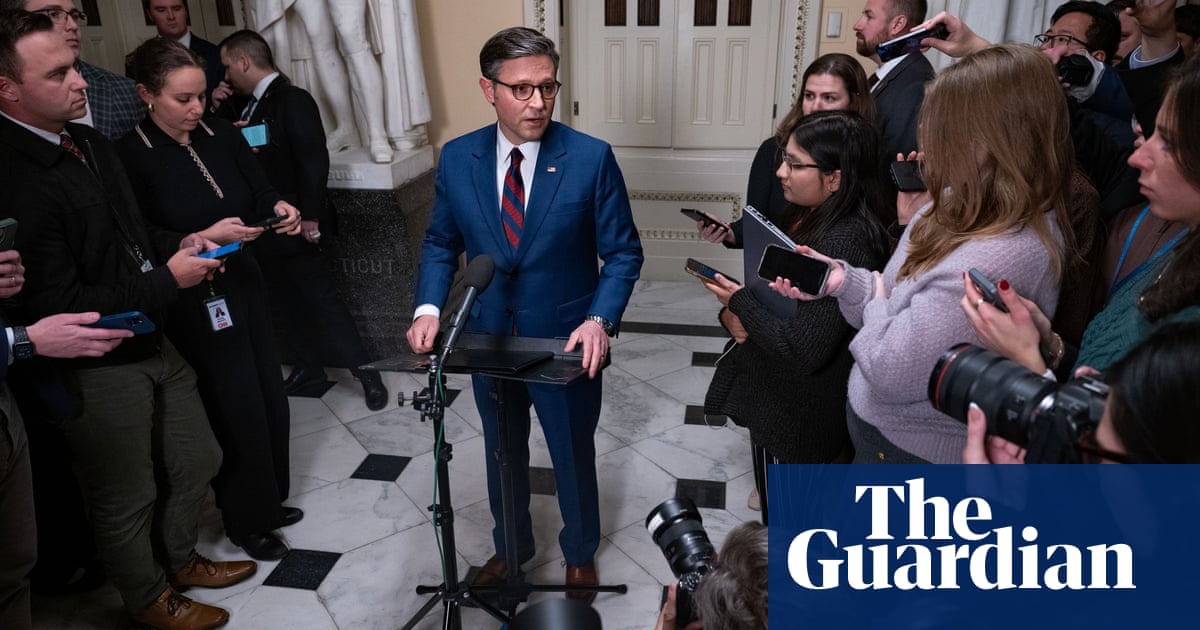The US House of Representatives passed a funding proposal Friday evening just hours before the US government was due to shut down, with a bill that dropped Donald Trump’s demand for a debt limit increase.
The bill, which passed 366-34, approves government funding for three months and will be sent to the Senate, where it is expected to pass.
The vote came after the president-elect and his billionaire ally, Elon Musk, scuttled a prior bipartisan deal at the last minute, sparking conflicts within the Republican party.
The bill now on its way to the Senate temporarily funds federal operations at current levels and adds $100bn in disaster aid and $10bn in assistance to farmers.
The breakdown within the Republican party in the final days of the year offered a preview of the chaos that Trump is expected to bring when he returns to the White House on 20 January. A shutdown would have forced thousands of US government workers to be furloughed and could have disrupted holiday travel. The last federal shutdown happened in December 2018, in Trump’s first term.
The original bipartisan bill had been negotiated by House Republicans and Democrats, but was attacked on Wednesday by Musk, the world’s richest man, who spent more than a quarter of a billion dollars to elect Trump. Musk warned that any lawmaker who supported the “outrageous” spending bill “deserves to be voted out in 2 years!”
In response, the Republican speaker of the House, Mike Johnson, put forward a second version of the bill, a pared-down budget proposal that included a brand-new demand from Trump: a suspension of the debt ceiling. Trump had calculated that suspending limits on the national debt while Biden was still in office would save him a difficult fight in his first few months in the White House.
Democrats decried the new bill as a cover for a tax cut to benefit wealthy backers such as Musk, while creating trillions of dollars in additional debt for the US. Several Republicans also rebelled, outraged by the proposed lifting of government borrowing limits.
The bill failed by a vote of 174-235, a humiliating setback for Trump.
The political drama this week showed that Trump’s grip on the Republican party is not ironclad. The president-elect had furiously urged the package to be passed, including threatening to support primary opposition candidates of Republicans who opposed it.
Earlier on Friday, Karine Jean-Pierre, the White House press secretary, launched a blistering attack on Republicans for their handling of the budget crisis. “Republicans blew up this deal – they did – and they need to fix this, period,” she told reporters. “[Republicans need] to stop playing politics with a government shutdown, and … they’re doing the bidding of their billionaire friends, that’s what we’re seeing, at the expense of hardworking Americans.”
While Jean-Pierre didn’t name specific individuals, her comments appear to be referencing Musk and Vivek Ramaswamy.
Democrats mocked the influence of the tech billionaire this week, referring to the interventions of “President Musk”. In a speech on Friday, Rosa DeLauro, the top Democrat on the appropriations committee, decried the meddling of the “world’s richest man who no one voted for”, saying it was Musk’s fault that “Congress has been thrown into pandemonium”.
Musk repeatedly spread misinformation about the bipartisan proposal he helped kill, the AP found. He claimed the plan would have given lawmakers a 40% raise when the maximum possible increase through the proposal was actually 3.8%. Musk also shared a false post claiming the proposal would have given $3bn to a potential new NFL stadium in Washington DC; the bill had a provision to transfer the land of the Washington Commanders stadium from the US government to the District of Columbia, but explicitly stated there would be no associated federal funding.
Trump earlier on Friday repeated his demand for the suspension – or even elimination – of the federal borrowing limit and insisted any shutdown should happen under Joe Biden’s watch rather than his own upcoming administration.
Democratic senator Chuck Schumer, the majority leader, said Friday night that he was “confident” the final bill would pass the Senate. “Though this bill does not include everything Democrats fought for, there are major victories in this bill for American families … emergency aid for communities battered by natural disasters, no debt ceiling, and it will keep the government open with no draconian cuts,” he said in a statement.
Among the 38 Republicans who voted against the Trump-backed debt ceiling package on Thursday were several members of the conservative, pro-Trump Freedom caucus. The group included prominent conservatives like Andy Biggs, Paul Gosar, Chip Roy and Scott Perry, who have historically been strong Trump allies but are drawing a line at lifting government borrowing limits.
Kat Cammack, a Republican congresswoman who voted against the bill, told reporters that “this was not an easy vote for constitutional conservatives”
The Associated Press contributed to reporting











